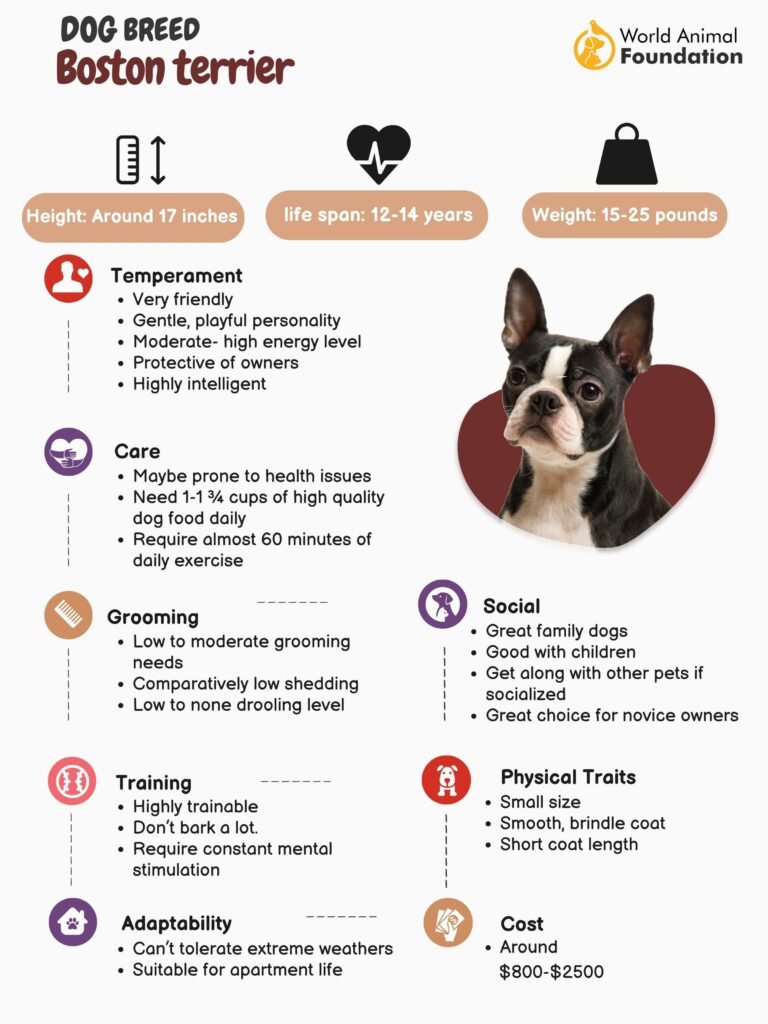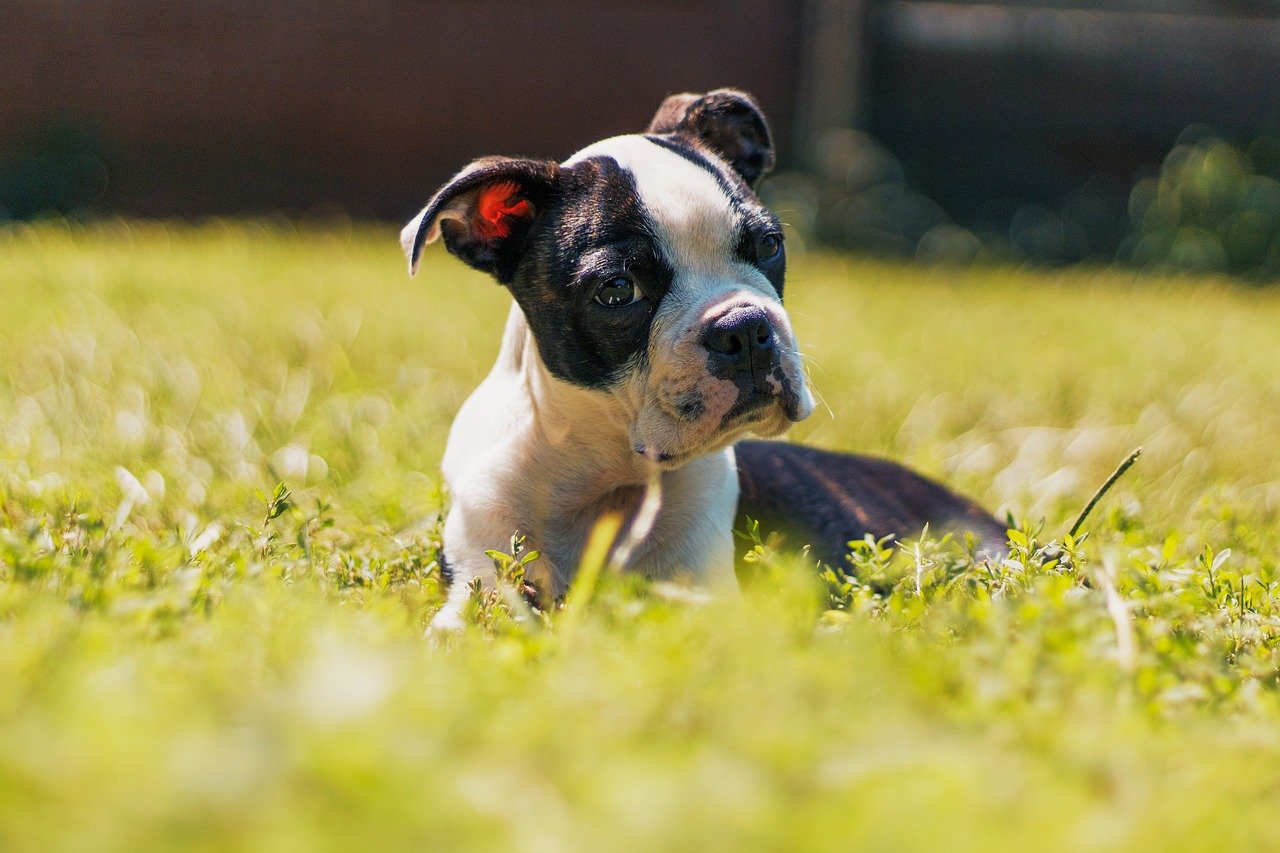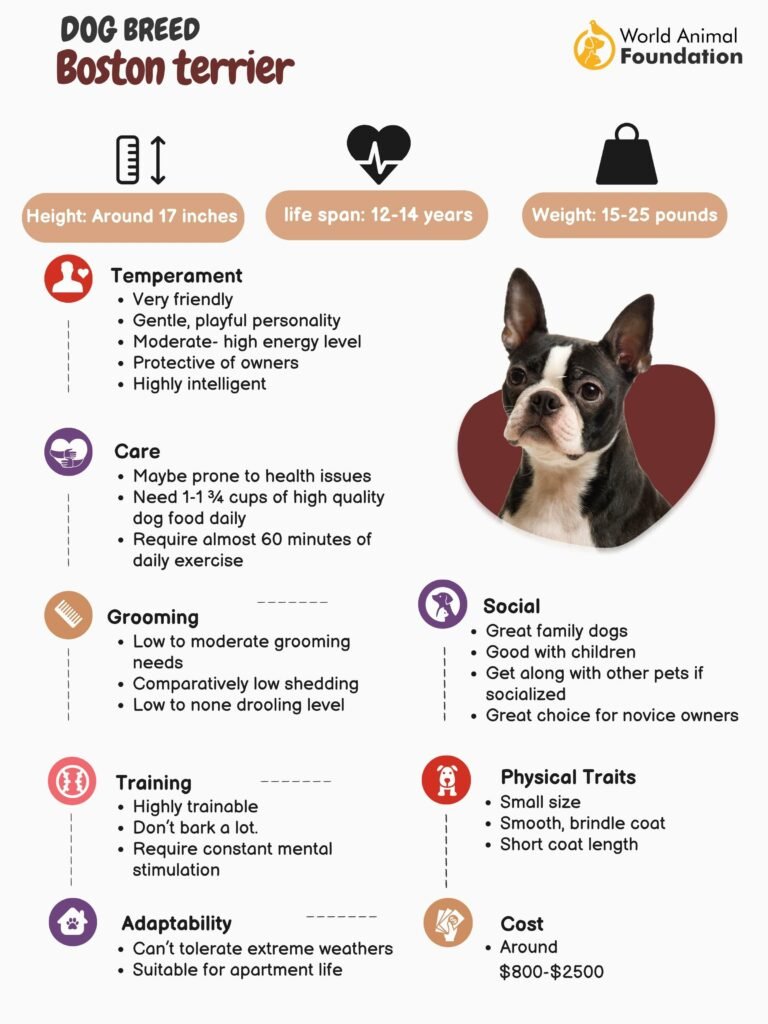If you’ve ever had the joy of being around a Boston Terrier puppy, you might be curious about their biting habits. So, how long do Boston Terrier puppies bite? Let’s dive in and explore this adorable but slightly mischievous behavior together!
Boston Terrier puppies, like most puppies, have a natural instinct to explore the world through their mouths. This means you can expect some playful biting during their early months. But don’t worry, it’s a normal part of their development!
As Boston Terrier puppies grow, they gradually learn through socialization and training that biting is not acceptable. With consistent guidance and positive reinforcement, their biting behavior should decrease over time. So, let’s discover some helpful tips that can make this bite-y phase a little easier for everyone involved. Keep reading!

The Duration of Boston Terrier Puppies Biting: What to Expect
When bringing home a Boston Terrier puppy, it’s essential to be prepared for the teething stage. Puppies, like humans, go through a phase where they explore the world with their mouths. This behavior includes biting and nibbling on various objects, including hands and feet. The duration of this biting phase can vary from puppy to puppy, but understanding what to expect can help you navigate this challenging period with patience and ease.
Why Do Boston Terrier Puppies Bite?
Before diving into the duration of the biting phase, it’s essential to understand why Boston Terrier puppies bite. Biting is a natural instinct for puppies as they explore their environment and learn about their surroundings. Just like human babies, they use their mouths to understand textures, tastes, and even social dynamics. Additionally, teething can contribute to a stronger desire to bite and chew, as the puppy’s teeth are growing and causing discomfort. So, while it may be frustrating, it’s important to remember that biting is a normal part of a puppy’s development.
1. The Start of the Biting Phase
When you first bring home a Boston Terrier puppy, their biting behavior may not be immediately apparent. Initially, they may nibble gently or explore objects with their mouths. However, as they become more comfortable in their new environment, the biting phase will likely begin. This phase typically starts around three to four months of age when the puppy’s baby teeth start to fall out, making way for their adult teeth. During this stage, you may notice an increase in biting and chewing activities.
It’s important to provide appropriate chew toys during this phase to redirect their biting behavior onto objects meant for them. Additionally, consistent and gentle training can help teach your puppy that biting is not acceptable behavior.
2. Heightened Biting Behavior
As Boston Terrier puppies reach the age of five to six months, their biting behavior may intensify. This increase can be due to various factors, including a stronger desire to explore and interact with their environment. They may become more playful and engage in rougher play, which may involve more frequent and sometimes harder bites. This phase requires a consistent approach to training, ensuring that the puppy understands the boundaries and the difference between appropriate and inappropriate biting.
During this period, it’s crucial to provide them with ample exercise and mental stimulation to help channel their energy and prevent the development of bad biting habits. Regular socialization with other puppies and dogs can also help teach them appropriate play and bite inhibition.
3. Tapering Off of Biting Behavior
As Boston Terrier puppies approach one year of age, their biting behavior should start to decrease. By this time, they have most likely lost all their baby teeth, and their adult teeth are fully developed. The teething discomfort should no longer be a factor, and they will have learned appropriate bite inhibition through consistent training and social interactions.
However, it’s important to note that every puppy is different, and the duration of the biting phase can vary. Some puppies may continue to exhibit biting behavior for a few months beyond the one-year mark, while others may stop earlier. Patience, consistency, and positive reinforcement training are key during this period.
Tips for Managing Biting Behavior in Boston Terrier Puppies
While it can be challenging to deal with biting behavior in Boston Terrier puppies, especially during their teething phase, there are several strategies you can employ to manage and redirect their behavior:
Training and Socialization:
Consistent training and socialization from an early age are crucial to teach your puppy appropriate behavior and to develop bite inhibition. Enroll your puppy in puppy classes or obedience training to reinforce positive behavior and teach them basic commands. Regular socialization with other puppies and dogs in a controlled and supervised environment can also help them learn acceptable play and bite inhibition.
Provide Appropriate Chew Toys:
Offer a variety of chew toys specifically designed for teething puppies. These toys help soothe their discomfort and redirect their biting behavior onto appropriate objects. Choose toys made of durable material that can withstand their chewing and are safe for their teeth and gums.
Discourage Biting:
If your Boston Terrier puppy bites you, it’s important to discourage this behavior without resorting to harsh punishment. Yelling or physical force can lead to fear and aggression in puppies. Instead, redirect their attention to an appropriate chew toy or remove yourself from their reach, signaling that biting leads to the end of playtime or attention.
Be Consistent:
Consistency is key when managing biting behavior in Boston Terrier puppies. Set clear rules and boundaries regarding biting and enforce them consistently. Avoid rough play or games that encourage biting, as this may confuse the puppy about what is acceptable behavior.
Positive Reinforcement:
Use positive reinforcement techniques to reward your puppy for appropriate behavior. Whenever they choose to chew their toys instead of biting you or others, offer praise, treats, or playtime. This positive association will help reinforce good habits and encourage the puppy to continue making the right choices.
Key Takeaways: How Long Do Boston Terrier Puppies Bite?
- Boston Terrier puppies typically go through a biting phase that can last for a few months.
- It is important to provide proper training and socialization to help them learn good behavior.
- Consistency and patience are key when teaching puppies to stop biting.
- Redirecting their biting behavior towards toys or chew bones can be effective.
- With proper guidance and training, most Boston Terrier puppies will outgrow their biting phase.
Frequently Asked Questions
Welcome to our FAQ section, where we answer your burning questions about how long Boston terrier puppies bite. If you’re a proud Boston terrier owner, you may be wondering about their biting habits. Don’t worry, we’ve got you covered!
1. How long does the biting phase last for Boston terrier puppies?
The biting phase for Boston terrier puppies usually lasts until they are around four to six months old. During this time, their puppy teeth are coming in, and they may also be teething, which can lead to increased biting behavior. It’s important to remember that this biting is usually not aggressive, but rather a way for them to explore their environment and interact with you.
As a responsible owner, you can help your Boston terrier puppy navigate this phase by providing them with plenty of appropriate chew toys, redirecting their biting behavior, and using positive reinforcement to encourage gentle play. With consistency and patience, this phase will pass, and your puppy will grow out of their biting tendencies.
2. How should I handle biting during playtime with my Boston terrier puppy?
Biting is a common behavior during playtime with Boston terrier puppies. They use their mouths to interact and communicate with their littermates, and they might carry this habit over into playtime with you. If your puppy bites you during play, it’s important to establish boundaries and teach them what is acceptable behavior.
When your puppy bites during play, calmly remove your hand or the toy they are biting and redirect their attention to an appropriate chew toy. You can also use a word or sound, like “ouch” or “no,” to let them know that biting is not okay. Consistency is key, and over time, your Boston terrier puppy will learn that rough play and biting are not acceptable.
3. My Boston terrier puppy’s biting seems aggressive. What should I do?
If your Boston terrier puppy’s biting behavior seems aggressive, it’s important to address it as soon as possible. Aggressive biting may include growling, lunging, or snapping. In such cases, it’s best to seek guidance from a professional dog trainer or behaviorist who can assess the situation and provide guidance tailored to your specific puppy.
Remember, aggression in puppies is not a normal behavior and should be taken seriously. A professional can help determine the underlying cause of the aggression and work with you to develop a training plan to address the issue. The earlier you address aggressive biting behavior, the better the chances of successfully modifying it.
4. Are there any techniques to prevent or minimize biting in Boston terrier puppies?
Yes, there are techniques you can use to prevent or minimize biting in Boston terrier puppies. Here are a few tips:
– Provide plenty of appropriate chew toys: Having a variety of chew toys will give your puppy something appropriate to bite and chew on.
– Use positive reinforcement: Praise and reward your puppy when they exhibit gentle play and refrain from biting.
– Redirect their biting: When your puppy starts to bite, redirect their attention to an appropriate chew toy or engage them in a different activity.
– Socialize your puppy: Exposing your Boston terrier puppy to different people, animals, and situations can help them learn appropriate behaviors and reduce biting tendencies.
– Seek professional help if needed: If you’re struggling to manage your puppy’s biting behavior, don’t hesitate to consult with a professional dog trainer or behaviorist for guidance.
5. Will my Boston terrier puppy naturally grow out of their biting phase?
Yes, most Boston terrier puppies will naturally grow out of their biting phase as they mature. Teething typically ends around six months of age, and as their permanent teeth come in, they will be less inclined to bite or chew on objects excessively. With proper training, consistency, and patience, you can help your puppy develop appropriate bite inhibition and outgrow their biting tendencies.
However, it’s essential to remember that each puppy is unique, and individual results may vary. Some puppies may take longer to outgrow their biting phase, while others may require more guidance and training. If you have any concerns about your puppy’s biting behavior, consulting with a professional can provide the expert advice and support you need.

Summary:
Boston terrier puppies usually bite a lot, but it’s a normal part of their development. They use their mouths to explore the world around them and learn important skills. However, it’s important to teach them bite inhibition and provide appropriate chew toys to redirect their biting behavior.
To manage puppy biting, engage in regular play sessions, use positive reinforcement to reward gentle behavior, and provide consistent discipline. Gradually, their biting should decrease as they learn what is acceptable and what is not. Remember, patience and consistent training are key to helping your Boston terrier puppy grow into a well-behaved adult dog.
In summary, while Boston terrier puppies may bite a lot, it is normal and can be managed through teaching bite inhibition and providing appropriate outlets for their chewing needs. With time and training, your puppy will learn to control their biting behavior and become a well-behaved companion.
